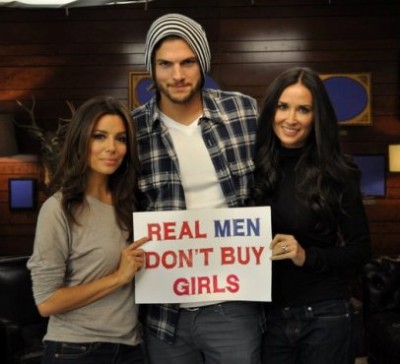
In December, I blogged about the cartoon-childhood violence meme that morphed from something else and was being criticized for being another example of “one-click activism.” There were interesting comments that are definitely food for thought.
Celebrity Causes & Controversial Issues
While the crowd can start a viral meme, celebrities can use social media to promote their cause to their followers. The idea of increasing awareness for causes can be tricky, particularly when there are “sides”. I don’t think anyone is countering Sarah McLachlan’s pleas to stop animal cruelty, but issues like Jenny McCarthy’s advocacy surrounding better knowledge surrounding childhood vaccination and autism does. She’s facing a backlash, particularly in light of the fraudulent Wakefield study. Mary Elizabeth Williams in Salon.com bashes her as a misguided mom, acting as if she’s railing against a mountain range of “science”, but, let me be frank here. The journalism of Mary Elizabeth Williams doesn’t scream health sciences expert, plus, it seems like she doesn’t even read what she links to. She cherrypicked a quote by McCarthy on the Oprah site, but conveniently left this out::
“I am all for [vaccines], but there needs to be a safer vaccine schedule. There needs to be something done. The fact that the [Centers for Disease Control and Prevention] acts as if these vaccines are one size fits all is just crazy to me…People need to start listening to what the moms have been saying.”
This is hardly the ravings of a lunatic. Plus, the problems with the “science” that Williams cites is that they do not prove that a vaccine-autism link does not exist. It may well be more complex than the studies are allowing for, with certain, very specific subpopulations at risk.
Is Bad PR Better than No PR?
So, this week, power couple Demi & Ashton started a campaign to fight sex trafficking, “Real Men Don’t Buy Girls”. The ads have people scratching their heads.
I get the execution of the ads, but I think it’s a bad one. It’s using hyperbole and humour to make a point, while riffing on the Old Spice “Your Man…” campaign. The idea is that “real men” do certain things and don’t “buy girls”, so be a real man and don’t buy girls.
Jezebel took the trafficking ads to task, but included a quote by Helen A.S. Popkin didn’t sit right::
“One might argue that faux-zany vignettes in which Jamie Foxx opens a beer bottle with a remote and Bradley Cooper eats cereal bachelor-style are as effective at wiping out underage sex trafficking as posting the color of your bra in your Facebook status is at eradicating breast cancer. The video campaign just costs way more money.”
Popkin’s post is chock full of snarky cleverness and deconstructs the false syllogism, apparently unaware that effective advertising or campaigns need not be logical. Let me see, “the war on terror = the war in Iraq, hence…,” oh, nevermind. Popkin’s use of a Facebook meme example points to a recurring theme that people resent what they feel is tantamount to doing nothing. This may well be the case, but it doesn’t mean it’s always the case and I think it’s short-sighted to see anything having the appearance of an “identity” campaign, where a user identifies with a cause ostensibly to raise awareness as doing nothing. The challenge is to leverage the identity and awareness into action. Here’s a better critique of the ads on bumpshack.
Demi Moore isn’t concerned about the backlash::
“People’s criticism has created even more conversation…While we didn’t want to offend anybody and it’s certainly not our intention to make light of any issue we take very seriously, we see that it’s actually doing what we intended.”
The question I have is what exactly is the intent? Well, Demi and Ashton have a foundation and you can donate to fund more multifaceted campaigns to promote…awareness, as well as demand reduction strategies. They also have a page listing what you can do to help, including flagging/reporting ads on Craigslist.
Well, nevertheless, it’s a good cause, right? Not everyone thinks so. Melissa Gira Grant is calling Demi and Ashton out on their publicity stunt, providing links to organizations working on providing support for those in the sex trade. I must admit that I’m a bit troubled by D&A’s attempts to curb a serious problem, but the execution is just symptomatic of the entire approach. It reeks of paternalism and focuses on “girls” being trafficked, feeding into a saviour theme of philanthropy. Moreover, as it stands, their foundation’s initiatives are paper thin and does smack of a publicity stunt, given how there are many existing organizations doing work in the sex trafficking arena. Finally, the approach is hostile to sex work outside of trafficking by advocating vigilanteism on the Internet, smacking of Amber Lyon’s “investigative journalism” on the matter for CNN.
I think this is less about social media and “one-click activism” as it is about misguided celebrity ventures. While some might piss and moan that the use of social media in getting the word out doesn’t amount to a hill of beans, but I would argue that there’s a danger of celebrity use of social media that can result in misguided actions.



